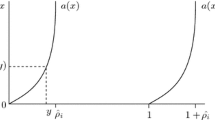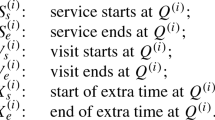Abstract
We introduce, analyse and optimize the class of Bernoulli random polling systems. The server movescyclically among N channels (queues), butChange-over times between stations are composed ofwalking times required to ‘move’ from one channel to another andswitch-in times that are incurredonly when the server actually enters a station to render service. The server uses aBernoulli random mechanism to decide whether to serve a queue or not: upon arrival to channeli, it switches in with probabilityp i , or moves on to the next queue (w.p. 1 —p i ) without serving any customer (e.g. packet or job). The Cyclic Bernoulli Polling (CBP) scheme is independent of the service regime in any particular station, and may be applied to any service discipline. In this paper we analyse three different service disciplines under the CBP scheme: Gated, Partially Exhaustive and Fully Exhaustive. For each regime we derive expressions for (i) the generating functions and moments of the number of customers (jobs) at the various queues at polling instants, (ii) the expected number of jobs that an arbitrary departing job leaves behind it, and (iii) the LST and expectation of the waiting time of a cutomer at any given queue. The fact that these measures of performance can be explicitly obtained under the CBP is an advantage over all “parameterized” cyclic polling schemes (such as the k-limited discipline) that have been studied in the literature, and for which explicit measures of performance are hard to obtain. The choice of thep i 's in the CBP allows for fine tuning and optimization of performance measures, as well as prioritization between stations (this being achieved at a low computational cost). For this purpose, we develop a Pseudo-conservation law for amixed system comprised of channels from all three service disciplines, and define a Mathematical Program to find the optimal values of the probabilities {p i } N i =1 so as to minimize the expected amount of unfinished work in the system. Any CBP scheme for which the optimalp i 's are not all equal to one, yields asmaller amount of the expected unfinished work in the system than that in the standard cyclic polling procedure with equivalent parameters. We conclude by showing that even in the case of a single queue, it is not always true thatp 1=1 is the best strategy, and derive conditions under which it is optimal to havep 1 < 1.
Similar content being viewed by others
References
Altman E, Khamisy A, Yechiali U (1991) Threshold Service Policies in Polling Systems. Preprint
Altman E, Konstantopoulos P, Liu Z (1992) Stability, Monotonicity and Invariant Quantities in General Polling Systems.Queuing Systems 11, special issue on Polling Models, Eds. H. Takagi and O. Boxma, pp. 35–57
Baker JE, Rubin I (1987) Polling with a General-Service Order Table.IEEE Transactions on Communications 35:283–288
Boxma OJ (1989) Workloads and Waiting Times in Single-Server Systems with Multiple Customer Classes.Queuing Systems 5:185–214
Boxma OJ, Groenendijk WP (1987) Pseudo-Conservation Laws in Cyclic-Service Systems.Journal of Applied Probability 24:949–964
Boxma OJ (1991) Analysis and Optimization of Polling Systems. In:Queueing Performance and Control of ATM (J. W. Cohen and C. D. Pack, Eds.), North Holland, pp. 173–183
Boxma OJ, Weststrate JA (1989) Waiting Times in Polling Systems with Markovian Server Routing. In:Messung, Modellierung und Bewertung von Rechensystemen und Netzen, (G. Stiege and J. S. Lie, Eds.), Springer, pp. 89–104
Browne S, Yechiali U (1989) Dynamic Priority Rules for Cyclic-Type Queues.Advances in Applied Probability 21:432–450
Ferguson MJ, Aminetzah YJ (1985) Exact Results for Nonsymmetric Token Ring Systems.IEEE Transactions on Communications 33:223–231
Khamisy A, Altman E, Sidi M (1992) Polling Systems with Synchronization Constraints.Annals of OR35, special issue on Stochastic Modelling of Telecommunicaton Systems, Eds. P. Nain and K. W. Ross, pp. 231–267
Kleinrock L (1976)Queuing Systems, Volume II: Computer Applications, John Wiley, New York
Kleinrock L, Levy H (1988) The analysis of random polling systems.Operations Research 36:716–732
Levy H (1989) Analysis of Binomial-Gated Service. In:Proceedings of Performance of Distributed and Parallel Systems, (T. Hasegawa, H. Takagi and Y. Takahashi, Eds.), North-Holland, pp. 127–139
Levy H (1989) Delay Computation and Dynamic Behavior of Non-symmetric Polling Systems.Performance Evaluation 10:35–51
Takagi H (1986)Analysis of Polling Systems, The MIT Press
Takagi H (1990) Queuing Analysis of Polling Models: an Update. In:Stochastic Analysis of Computer and Communications Systems, (H. Takagi, Ed.), Elsevier Science Pub., pp. 267–318
Tedijanto (1990) Exact Results for the Cyclic Service Queue with a Bernoulli Schedule.Performance Evaluation 11:107–115
Wolff RW (1989)Stochastic Modeling and the Theory of Queues, Prentice Hall
Yechiali U (1991) Optimal Dynamic Control of Polling Systems. In:Queueing, Performance and Control in ATM, (J. W. Cohen and C. D. Pack, Eds.), North Holland, pp. 205–217
Author information
Authors and Affiliations
Additional information
Supported by a Grant from the France-Israel Scientific Cooperation (in Computer Science and Engineering) between the French Ministry of Research and Technology and the Israeli Ministry of Science and Technology, Grant Number 3321190.
Rights and permissions
About this article
Cite this article
Altman, E., Yechiali, U. Cyclic Bernoulli polling. ZOR Zeitschrift für Operations Research Methods and Models of Operations Research 38, 55–76 (1993). https://doi.org/10.1007/BF01416007
Received:
Revised:
Issue Date:
DOI: https://doi.org/10.1007/BF01416007




